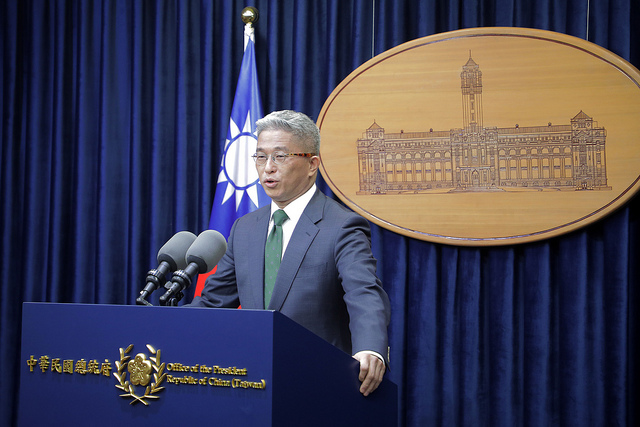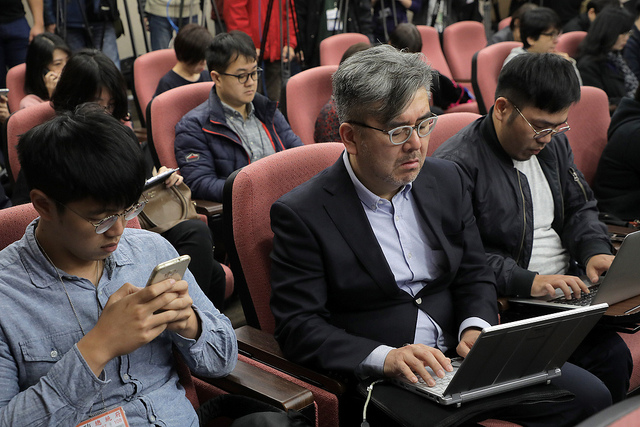News & activities
 News releases
News releases
On the morning of March 12, the Office of the President held a press conference to announce that President Tsai Ing-wen will lead a delegation to visit Palau and Nauru, leaving from Taiwan on March 21, continuing on to the Marshall Islands to attend an international conference. The planned itinerary was presented by Deputy Foreign Minister Hsu Szu-chien (徐斯儉).
Noting that President Tsai led a delegation to visit the Marshall Islands, Tuvalu, and the Solomon Islands in 2017, dubbed "Sustainable Austronesia, Working Together for a Better Future—2017 State Visits to Pacific Allies," Deputy Minister Hsu stated that the president has wanted to once again visit the leaders of our Pacific allies for some time in response to their numerous invitations. Palau President Tommy Remengesau, Jr. extended an invitation to President Tsai in November 2018 when he led a delegation to Taiwan. Meanwhile, Nauru President Baron Waqa personally gave a written invitation to President Tsai when he visited Taiwan this past January. Thus, President Tsai decided to lead a delegation themed "Oceans of Democracy" on state visits to Palau and Nauru from March 21 to 26 in order to demonstrate how we value our diplomatic partners in the Pacific, and to further enhance links and friendly relations with Pacific nations.
Deputy Minister Hsu also pointed out that Marshall Islands President Hilda C. Heine, the first female leader of a Pacific island nation, has actively advocated for women's rights ever since taking office. The Marshall Islands will host the first-ever Pacific Women Leaders' Coalition Conference on March 26, and President Heine has invited President Tsai to deliver an address there. To underline the importance she places on women's issues and show support for President Heine, President Tsai will attend this conference after the conclusion of her state visits.
Noting that the theme of this trip is "Oceans of Democracy," Deputy Minister Hsu pointed out that the president will visit three of Taiwan's diplomatic allies in Oceania: Palau, Nauru, and the Marshall Islands. Taiwan has much in common with these diplomatic allies and with the region. First, they share a maritime nature. All four countries are islands, and all emphasize sustainable development of the marine environment. Our second shared attribute is democracy. All four countries have democratic systems of government, and all agree on the importance of regional peace and stability. Therefore, on this trip we will exchange experiences with our diplomatic allies regarding democracy and the pursuit of sustainable development. This visit will show that the ocean is not a barrier, but rather a link between our countries.
When the subject of Kiribati came up, Deputy Minister Hsu explained that the Ministry of Foreign Affairs had originally suggested that the trip be scheduled from March 24 to 31, and in fact Kiribati President Taneti Maamau and the leaders of the other countries on the itinerary had already agreed to the schedule. However, due to the importance of President Tsai presiding over the Spring Memorial in Honor of National Martyrs on March 29, the Office of the President adjusted the dates to March 21 to 28. While Palau and Nauru were able to alter their schedules to accommodate the new dates, unfortunately President Maamau had a prior commitment to preside over a graduation ceremony at the Fiji campus of the University of the South Pacific, where he is chancellor. As the graduation event included guests from many countries, President Maamau was unable to change his schedule. Ultimately, Taiwan and Kiribati opted to choose a different date for President Tsai to visit.
Deputy Minister Hsu also noted that Taiwan's diplomatic allies in the Pacific have always strongly supported our international participation. For example, at the Micronesia Presidents' Summit held in Palau this past February 20–21, leaders and representatives in attendance from Palau, Nauru, Kiribati, the Marshall Islands, and the Federated States of Micronesia unanimously released a joint communique recommending that the Pacific Islands Forum adopt a more fair policy regarding the participation of Taiwan and China. Clearly, whether in terms of friendship or our Austronesian cultures, we share close bonds with our Pacific allies. Hsu expressed his belief that while this journey will help citizens of our diplomatic allies get to know Taiwan, it is even more important to introduce Taiwanese citizens to our good friends who have continually spoken up for Taiwan on the international stage, and to show them the pure beauty of these countries.
Deputy Minister Hsu said that the delegation will include National Security Council Secretary-General David T. Lee (李大維), Minister of Foreign Affairs Joseph Wu (吳釗燮), Minister of Health and Welfare Chen Shih-chung (陳時中), and Minister of the Council of Indigenous Peoples Icyang Parod (夷將‧拔路兒), as well as legislators. Representatives of healthcare institutions and the business community participating in cooperative medical projects with our Pacific allies will also join the delegation. There they will bear witness to the successful results of our cooperation, and will have the chance to explore more future possibilities.
Deputy Minister Hsu pointed out that the delegation is expected to depart on the afternoon of March 21 and arrive in Palau the same night. On March 24, they will proceed to Nauru, and on March 26, they will move on to the Marshall Islands to attend the conference. They are scheduled to return to Taiwan on the evening of March 28, making this an eight-day seven-night itinerary.
Deputy Minister Hsu also said that on this trip, the president will meet with Palau President Tommy Remengesau, Jr., Nauru President Baron Waqa, and Marshall Islands President Hilda C. Heine to engage in substantive exchanges on bilateral and international issues of mutual concern. In addition, the president will deliver a speech at the Pacific Women Leaders' Coalition Conference in the Marshall Islands, and will address the Nauru Parliament. She will also tour bilateral cooperation projects in the fields of healthcare, agriculture, and livestock, and will take the opportunity to highlight Taiwan's commitment to mutually beneficial "steadfast diplomacy," and help diplomatic allies achieve their sustainable development goals. Moreover, President Tsai will host banquets for Taiwanese expatriates in these countries as well as embassy staff and their families, to express gratitude for their work and to show concern for their well-being.










